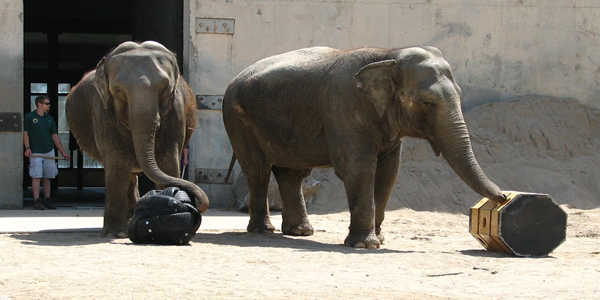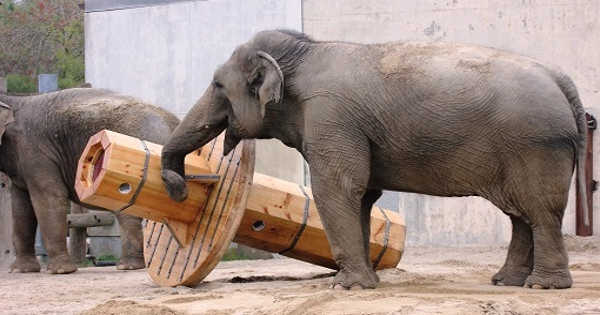Elephants, like humans, have distinct personalities. Individual personality traits, according to a new study from the University of Wyoming, play an important role in helping elephants solve problems. This study establishes links between two sources of individual variation in threatened species: personality and cognition.
Elephants have personalities, just like humans, according to new research published in the Journal of Comparative Psychology. Furthermore, an elephant’s personality may influence how well that elephant solves novel problems.
Lisa Barrett and Sarah Benson-Amram of the University of Wyoming’s Animal Behavior and Cognition Lab, led by Benson-Amram, wrote the article. It is available to view here. The authors of the paper used elephant caretakers to test 15 Asian elephants and three African savanna elephants in three zoos across the country: the San Diego Zoo, the Smithsonian’s National Zoological Park, and the Oklahoma City Zoo.
Elephants have their very own personalities, just like humans. According to a new study, individual personality traits play an important role in helping elephants solve problems.
Barrett and Benson-previous Amram’s research demonstrated that Asian elephants can use water as a tool to solve a novel problem – and reach a tasty marshmallow reward – in what’s known as the floating object task. This time, the authors devised new novel tasks for the elephants, as well as personality tests.
“We took a comprehensive approach, using three different problem-solving tasks and three different types of personality assessments to see if individual personality played a role in elephants’ ability to solve these tasks,” Barrett says. “Because we couldn’t give the elephants personality tests like you’re used to seeing online, we had to think creatively.”
The research focused on 15 Asian elephants and three African savanna elephants in zoos throughout the United States. Previous research had shown that Asian elephants can use water as a tool to solve a novel problem – and thus obtain a food reward – in what is known as the floating object task.

The authors devised novel object tests in which they presented the elephants with an unfamiliar object, such as a mylar balloon, a burned log, or the scent of a predator (lion or hyena), and recorded their responses. You can watch videos of the novel object trials, which include a balloon, a burned log, and urine. They also asked elephant caregivers to complete a survey about the personalities of the animals in their care, and they watched the elephants interact with one another in their zoo habitats.
Barrett and Benson-Amram learned from those assessments that surveys and observations were the most reliable methods for determining elephant personality. Barrett and Benson-Amram measured traits like active, affectionate, aggressive, defiant, excitable, mischievous, shy, and sociable, all of which have been studied in other animals.
“We were curious to see if the personality traits revealed by the surveys and observations predicted success on novel problem-solving tasks,” says Benson-Amram. “We gave the elephants three chances to solve each task, and we measured whether they learned to solve faster over time, and then we traced their success back to their personality type.”
The trap tube task, which is a common test used with primates but had never been presented outside of primates before, was one of the three problem-solving tasks. You can watch videos of the problem-solving trials, which include boxed ball, rod ball, and trap tube.
Barrett and Benson-Amram discovered that elephants learned to solve two of the three tasks faster over time, despite only receiving three trials on each task. Overall, personality traits such as aggressiveness and activity were significant predictors of problem-solving ability, but the personality traits measured did not significantly predict learning ability.
This study establishes links between two sources of individual variation in threatened species: personality and cognition. One reason it is important to study problem-solving in elephants is that they are constantly confronted with new problems that they must solve in the wild. Elephants, for example, may be more likely to invade farmland and contribute to human-elephant conflict if certain traits enable them to overcome novel problems. With more research, managers will be able to predict which elephants will overcome or become accustomed to deterrents, and they will be able to devote more resources to tracking elephants.
The authors advocate for more research into various types of personality assessments to determine which methods would be best for managing zoo and wild elephants.
“Research with free-roaming elephants can extend this study to determine which personality traits are most important for solving novel problems that elephants face in the wild,” says Barrett, a 2020 graduate of the UW’s Program in Ecology and the Department of Zoology and Physiology.













